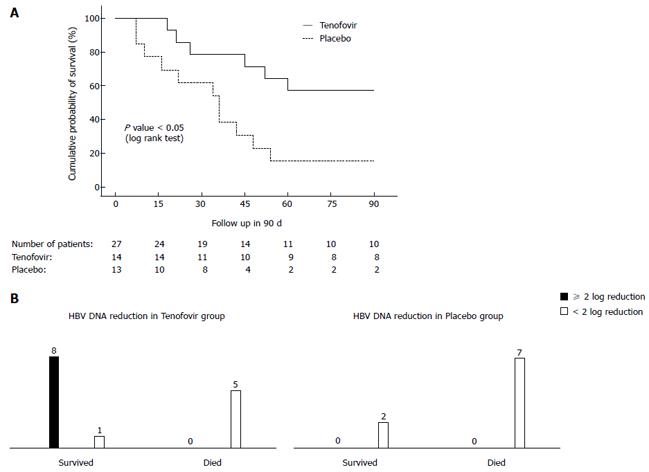Copyright
©2014 Baishideng Publishing Group Inc.
World J Gastroenterol. Nov 21, 2014; 20(43): 16037-16052
Published online Nov 21, 2014. doi: 10.3748/wjg.v20.i43.16037
Published online Nov 21, 2014. doi: 10.3748/wjg.v20.i43.16037
Figure 4 Cumulative survival of two groups of acute on chronic liver failure-hepatitis B virus patients treated with tenofovir vs placebo is shown in the Kaplan-Meier graph below.
A: Cumulative survival of acute on chronic liver failure-hepatitis B virus (ACLF-HBV) group of patients who were randomized to receive tenofovir vs placebo. Of the 90 patients with ACLF of different etiologies, 27 (26%) were due to reactivation of chronic hepatitis B. The median baseline HBV DNA level was 9 × 105 IU/mL. Fourteen patients received tenofovir and 13 placebo. At 3 mo the probability of survival was higher in the tenofovir than the placebo group [8/14 (57%) vs 2/13 (15%), respectively; P < 0.03]. The cause of death in the 15 patients was progressive liver failure leading to multiorgan failure. In the surviving patients, there was a significant improvement in the Child-Turcotte Pugh (CTP) and model for end-stage liver disease (MELD) scores and significant decline in the HBV DNA levels in the tenofovir group, whereas these parameters did not change significantly in the placebo group. B: A 2-log reduction in HBV DNA level at 2 wk predicted survival benefit. Garg et al[61] 2011 (Hepatology). HBV: Hepatitis B virus.
- Citation: Philips CA, Sarin SK. Potent antiviral therapy improves survival in acute on chronic liver failure due to hepatitis B virus reactivation. World J Gastroenterol 2014; 20(43): 16037-16052
- URL: https://www.wjgnet.com/1007-9327/full/v20/i43/16037.htm
- DOI: https://dx.doi.org/10.3748/wjg.v20.i43.16037









